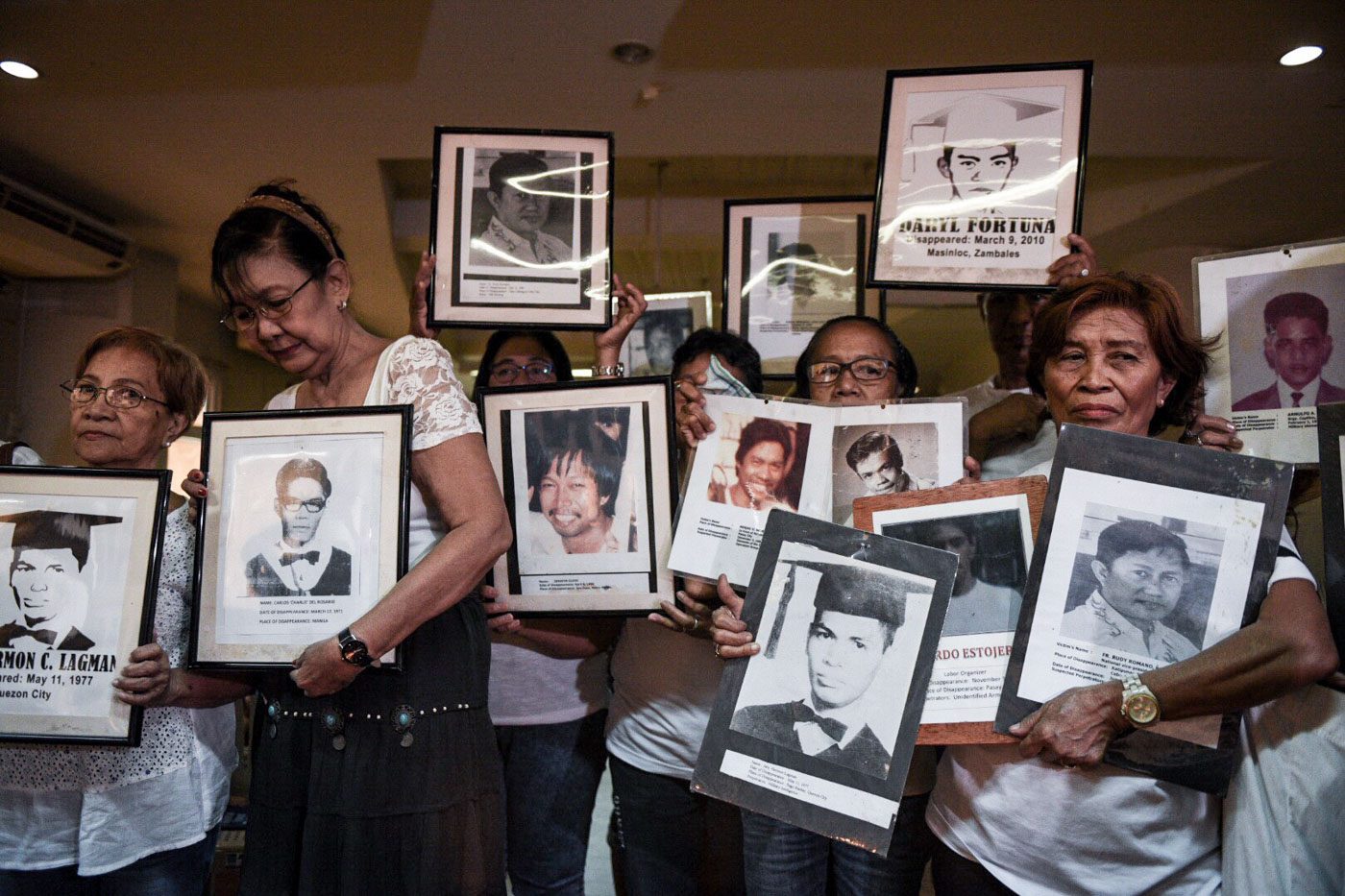SUMMARY
This is AI generated summarization, which may have errors. For context, always refer to the full article.

MANILA, Philippines (UPDATED) – Families of victims “strongly object” to the move of the Philippine government to have official records of enforced disappearances deleted from the United Nations (UN).
In a statement, the Free Jonas Burgos Movement called the plan “insulting” to many families who are striving to seek justice for their missing loved ones.
“It is disrespectful, totally disregarding and dismissing the suffering of the families of all the missing,” the group said on Monday, February 18. “It is an attack against all of us who continue to be uncertain about the fate and whereabouts of our relatives.”
The group is composed of family and friends of farmer-activist Jonas Burgos, who was abducted by alleged military agents in 2007 and is one of the most documented victims of enforced disappearance in the Philippines. (READ: Jonas Burgos: Trapped in web of lives)
The Department of Foreign Affairs (DFA), in a press release on February 15, announced that the government was asking the UN Working Group to delist 625 cases of enforced and involuntary disappearances recorded from 1975 to 2012.
The Philippine delegation, led by Undersecretary Severo Catura of the Presidential Human Rights Committee, highlighted the government’s “sincere commitment” to working toward implementing “a humane approach to development and governance.” It added it would continue to assist families of the disappeared.
Families of Victims of Involuntary Disappearance (FIND), meanwhile, said the proposal “smacks of deceit.”
“Sweeping these hapless victims under the rug will never hide the truth that it was their courageous resistance to repression and injustice that led to their involuntary disappearance,” FIND co-chairperson Nilda Sevilla said.
“FIND strongly urges the Philippines to judiciously reconsider pursuing its delisting proposal to the UN WGEID even as the organization believes that the working group will remain faithful to its mandate to serve the cause of the disappeared and their families,” she added.
The Concerned Artists of the Philippines also slammed the move, calling it an “assault to history itself.”
CAP said that, aside from erasing the efforts made by families, the proposal may set a dangerous precedent to other forms of human rights abuses reported to the UN.
“If the UN Working Group accedes to this request, what is to prevent the Philippine government from similarly moving for the dismissal of other rights violations, including thousands of extrajudicial killings (EJKs) of suspected drug users and pushers, farmers, clergy, doctors, indigenous peoples, and media workers, on the flimsy claim that ‘sufficient domestic mechanisms’ are being put in place?” the group said.
False reports?
The government, in the dialogue with the UN Working Group, also underscored the alleged “false information” submitted to the UN regarding cases of enforced disappearances.
Karapatan condemned this allegation and said that families and several non-governmental organizations submitted reports that were based on meticulous documentation and research.
The reports given to various international groups, including the UN, were a product of collaboration and an answer to the state’s inaction, they said.
“Since domestic mechanisms have failed in attaining justice, families of the disappeared have sought redress through international mechanisms such as UN WGEID to underscore the fact that their loved ones remain missing, that the victims and the crimes against them should be recognized, and that the State remains accountable for these crimes,” Karapatan secretary general Tinay Palabay said in a statement.
Domestic mechanisms not working
According to latest data from the FIND, there are at least 1,996 documented cases of enforced disappearance in the Philippines since the administration of Ferdinand Marcos. (READ: What you need to know about enforced disappearances in the Philippines)
In 2012, then-president Benigno Aquino III signed into law the Anti-Enforced or Involuntary Disappearance Act – the first of its kind in Asia. Families of victims, however, said the law has yet to achieve its full potential due to lack of funding and the implementers’ verall improper grasp of the concept of human rights. (READ: Poor law implementation denies desaparecidos justice)
“While the Philippine government takes pride in having enacted the first and only comprehensive law against enforced disappearance in Asia, it brazenly disregards pertinent essential provisions of the law that give hope to the families of the disappeared for justice notwithstanding the passage of time,” FIND said.
Until their loved ones are found and those responsible are held accountable, the Free Jonas Burgos Movement said the “so-called domestic mechanisms by the Philippine government remains a failure.”
“We went to [UN Working Group’s] office because all legal remedies inside the country have failed and we want you to intervene in the search for justice for these crimes against the Filipino people,” the group said. “Heed our plea: listen to the agony of the victims’ call for justice.” – Rappler.com
Add a comment
How does this make you feel?
There are no comments yet. Add your comment to start the conversation.